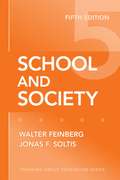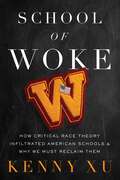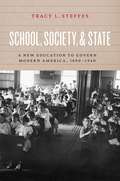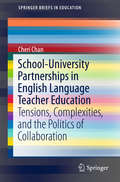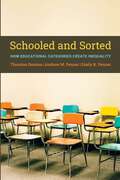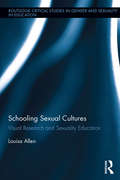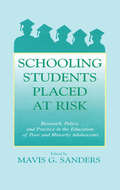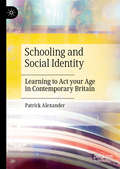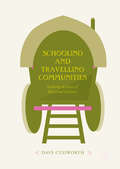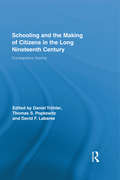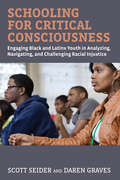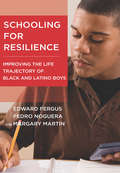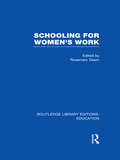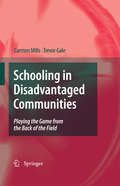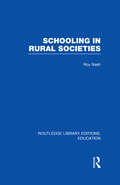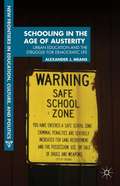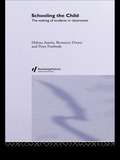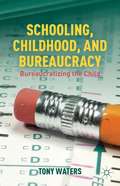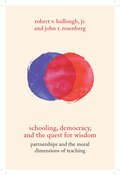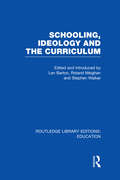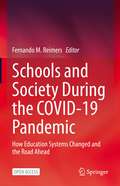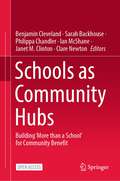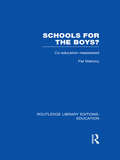- Table View
- List View
School and Society
by Jonas F. Soltis Walter Feinberg Pamela WolfbergThis widely used text has been expanded to include the most important issues in contemporary schooling, including new end-of-chapter sections for Further Reading and new references added to the useful Additional Resources section. School and Society, Fifth Edition uses realistic case studies, dialogues, and open-ended questions designed to stimulate thinking about problems related to school and society, including curriculum reform, social justice, and competing forms of research. Written in a style that speaks directly to today's educator, this book tackles such crucial questions as: Do schools socialize students to become productive workers? * Does schooling reproduce social class and pass on ethnic and gender biases? * Can a teacher avoid passing on dominant social and cultural values? * What besides subjects do students really learn in schools? School and Society is one of the five books in the highly regarded Teachers College Press Thinking About Education Series, now in its Fifth Edition. All of the books in this series are designed to help pre- and in-service teachers bridge the gap between theory and practice.
School of Woke: How Critical Race Theory Infiltrated American Schools and Why We Must Reclaim Them
by Kenny XuFrom one of America&’s most relentless critics of Critical Race Theory comes this far-reaching, on-the-ground investigation of how CRT infiltrated our public schools and transformed them into activism factories—with disastrous results. Awareness of the rise of Critical Race Theory (CRT) in public schools and how it has shaped our education system took the U.S. by storm over the last few years. Parents truly became aware for the first time how deeply entrenched CRT was in the classrooms, and their eyes were opened to the insidious agenda thoroughly embedded in public schools. As a result, CRT and parental rights in education became some of the most explosive issues facing Americans today. Kenny Xu is a perceptive and relentless critic of CRT and our culture&’s war on meritocracy. And now, in School of Woke, Xu exposes how CRT is transforming public schools and having a destructive impact on our children&’s education—and their future. In School of Woke, Xu provides historical context to the rise of Critical Race Theory in education, tracing it back to elite graduate schools in the 1970s and showing how the ideology became institutionalized and credentialed. Xu covers the battles taking place in the most problematic and contested school districts in the nation, including Loudoun and Fairfax County Public Schools in Northern Virginia and Santa Barbara High School in California. He also exposes the lucrative business model behind the diversity consulting industrial complex that is instrumental in the curricular wars, revealing how educators and administrators have been gaslighting the public about the prevalence of this radical ideology in the classrooms, where children as young as five are being segregated in the classroom by race and are being taught that whiteness is inherently evil. A work of colorful reportage, historical analysis, and cultural commentary, School of Woke reveals what it will take to extricate our next generation from the destructive trends in our once-vaunted public school education system.
School, Family, and Community Partnerships
by Joyce L. EpsteinUpdated and revised throughout, Joyce EpsteinOCOs classic book provides a framework for thinking about, talking about, and actually building comprehensive programs for school and family partnerships.
School, Society, & State: A New Education to Govern Modern America,1890-1940
by Steffes Tracy L."Democracy has to be born anew every generation, and education is its midwife," wrote John Dewey in his classic work The School and Society. In School, Society, and State, Tracy Steffes places that idea at the center of her exploration of the connections between public school reform in the early twentieth century and American political development from 1890 to 1940. American public schooling, Steffes shows, was not merely another reform project of the Progressive Era, but a central one. She addresses why Americans invested in public education and explains how an array of reformers subtly transformed schooling into a tool of social governance to address the consequences of industrialization and urbanization. By extending the reach of schools, broadening their mandate, and expanding their authority over the well-being of children, the state assumed a defining role in the education--and in the lives--of American families. In School, Society, and State, Steffes returns the state to the study of the history of education and brings the schools back into our discussion of state power during a pivotal moment in American political development.
School-University Partnerships in English Language Teacher Education
by Cheri ChanThis book addresses the complex issues that arise in school-university collaborative action research projects. Employing sociocultural perspectives on examining professional practices of in-service teachers, it examines the complexities of negotiating beliefs, identities and interpersonal relations when educators from two different institutional cultures collaborate. Specifically, the book explores issues such as the discourses that are operative in school-university collaboration for English language teacher education; the way in which beliefs, interpersonal relations and identities are negotiated in school-university partnership; what tensions and complexities operate in collaborative action research discourse in an educational context; and how school-university collaboration can be achieved. The book adopts a critical perspective and provides arguments from a non-Western sociocultural perspective.
Schooled and Sorted: How Educational Categories Create Inequality
by Thurston Domina Andrew M. Penner Emily K. PennerSociety primarily views education as a way to teach students skills and knowledge that they will draw upon as they move into their adult lives. However, schools do more than educate students – they also place students into categories, such as kindergartner, English language learner, and honor roll student. But do these categories have larger consequences than simply sorting students into classrooms? In Schooled & Sorted Thurston Domina, Andrew M. Penner, and Emily K. Penner, explore how educational categories reify and reinforce powerful existing social categories – including race, ethnicity, and class – and ultimately reproduce social and economic inequality in broader society. Domina and colleagues argue that while education is often seen as a tool for social mobility and reducing inequality, categories used in schools shape students’ access to resources, which ultimately have far-reaching impacts on their lives. The authors assert that the classes students are sorted into influence their educational experiences – students who are placed in higher-tracked classes are believed to have stronger academic skills than students in lower-tracked classes. As a result, more resources are often devoted to students in higher-tracked classes. Because many measures of academic achievement reflect values of the status quo, white, affluent students are overrepresented in these track assignments, leading to a reproduction of societal status and resource inequality within schools. This inequality within schools translates into lasting inequalities in the adult world. Society views educational achievement to be based on merit – high achievers have done well because they worked hard and are rewarded with resources, status, and power, including high-paying, high-status jobs at prestigious organizations. Those with lower educational status, on the other hand, are seen as undeserving and are therefore sorted into lower-paid jobs in lower-status professions and hold less influence. Domina and colleagues contend, however, that while educational categorization is unavoidable, a more equitable system, and thus a more equitable society, can be built. A key component is to build and uphold categories that emphasize educational goods that are inherently valuable, such as the ability to read, as opposed to those that derive value from scarcity, such as status and prestige. Schooled & Sorted is an illuminating investigation into the ways sorting within schools translates to sorting – and inequality – into the larger world.
Schooling Sexual Cultures: Visual Research in Sexuality Education (Routledge Critical Studies in Gender and Sexuality in Education)
by Louisa AllenMoving beyond the traditional focus on curriculum and pedagogy, this volume explores hidden dimensions of sexuality education in schools and how sexual meanings are produced. Challenging the standard understandings of sexuality education, Allen discusses how students’ knowledge of sexualities is often learnt outside the ‘official’ school curriculum in informal spaces such as the sports field, gym locker rooms and peer groups. By employing visual methods and analysing student photo-diaries, Allen’s original book captures a sexual culture of schooling that allow readers to literally ‘see through young people’s eyes.’ Introducing theoretical ideas in relation to queer theory and ‘new’ feminist new materialisms, this volume calls for a re-conceptualization of how sexuality comes into being at school, in order to take account of its material, spatial and embodied elements.
Schooling Students Placed at Risk: Research, Policy, and Practice in the Education of Poor and Minority Adolescents
by Mavis G. SandersThis book examines historical approaches and current research and practice related to the education of adolescents placed at risk of school failure as a result of social and economic conditions. One major goal is to expand the intellectual exchange among researchers, policymakers, practitioners, and concerned citizens on factors influencing the achievement of poor and minority youth, specifically students in middle and high schools. Another is to encourage increased dialogue about policies and practices that can make a difference in educational opportunities and outcomes for these students. Although the chapters in this volume are not exhaustive, they represent an array of theoretical and methodological approaches that provide readers with new and diverse ways to think about issues of educational equality and opportunity in the United States. A premise that runs through each chapter is that school success is possible for poor and minority adolescents if adequate support from the school, family, and community is available. *The conceptual approach (Section I) places the research and practice on students placed at risk in a historical context and sets the stage for an important reframing of current definitions, research, policies, and practices aimed at this population. *Multiple research methodologies (Sections II and III) allow for comparisons across racial and ethnic groups as well as within groups, and contribute to different and complementary insights. Section III, "Focus on African-American Students," specifically addresses gender and social class differences among African-American adolescents. *Current reform strategies presently being implemented in schools throughout the United States are presented and discussed (Part IV). These strategies or programs highlight how schools, families, and communities can apply research findings like the ones this book presents, thus bridging the often wide gap between social science research and educational practice.
Schooling and Social Identity: Learning to Act your Age in Contemporary Britain
by Patrick AlexanderThis book examines the nature of age as an aspect of social identity and its relationship to experiences of formal education. Providing a new and critical approach to debates about age and social identity, the author explores why age remains such an important aspect of self-making in contemporary society. Through an ethnographic account of a secondary school in the south-east of England, the author poses three principal questions. Why are schools in English organised according to age? How do pupils and teachers learn to ‘act their age’ while at school? Ultimately, why does age remain such an important and complex organising concept for modern society? Cutting across lines of class and gender, this timely book will be of interest to students and scholars of self-making and identity in educational contexts, and others interested in how schooling socialises young people into categories of age as the foundational building blocks of modern society.
Schooling and Travelling Communities: Exploring the Spaces of Educational Exclusion
by Dave CudworthThis book calls for a re-thinking of educational provision for Gypsy / Traveller communities. Despite having been recognised by the government and educational providers for over fifty years, underachievement of children from Gypsy / Traveller communities persists. Rather than focusing specifically on access, attendance and attainment, the author provides a structural analysis of the cultural tensions that often exist between Nomadic communities and current school provision based on the interests and values of Sedentarism. The author uses spatial theory as a base upon which to build knowledge and understanding of the educational exclusion of children from Gypsy / Traveller communities, highlighting the social role that space plays within schools. This innovative book will be of interest and value for students and scholars interested in not only education and Gypsy / Traveller communities, but education for minority communities more widely.
Schooling and the Making of Citizens in the Long Nineteenth Century: Comparative Visions (Routledge Research in Education)
by David F. Labaree Thomas S. Popkewitz Daniel TröhlerThis book is a comparative history that explores the social, cultural, and political formation of the modern nation through the construction of public schooling. It asks how modern school systems arose in a variety of different republics and non-republics across four continents during the period from the late eighteenth century to the early twentieth century. The authors begin with the republican preoccupation with civic virtue – the need to overcome self-interest in order to take up the common interest – which requires a form of education that can produce individuals who are capable of self-guided rational action for the public good. They then ask how these educational preoccupations led to the emergence of modern school systems in a disparate array of national contexts, even those that were not republican. By examining historical changes in republicanism across time and space, the authors explore central epistemologies that connect the modern individual to community and citizenship through the medium of schooling. Ideas of the individual were reformulated in the nineteenth century in reaction to new ideas about justice, social order, and progress, and the organization and pedagogy of the school turned these changes into a way to transform the self into the citizen.
Schooling as Violence: How Schools Harm Pupils and Societies
by Clive HarberAsking fundamental and often uncomfortable questions about the nature and purposes of formal education, this book explores the three main ways of looking at the relationship between formal education, individuals and society: * that education improves society* that education reproduces society exactly as it is* that education makes society worse and harms individuals. Whilst educational policy documents and much academic writing and research stresses the first function and occasionally make reference to the second, the third is largely played down or ignored. In this unique and thought-provoking book, Clive Harber argues that while schooling can play a positive role, violence towards children originating in the schools system itself is common, systematic and widespread internationally and that schools play a significant role in encouraging violence in wider society. Topics covered include physical punishment, learning to hate others, sexual abuse, stress and anxiety, and the militarization of school. The book both provides detailed evidence of such forms of violence and sets out an analysis of schooling that explains why they occur. In contrast, the final chapter explores existing alternative forms of education which are aimed at the development of democracy and peace. This book should be read by anyone involved in education - from students and academics to policy-makers and practitioners around the world.
Schooling for Critical Consciousness: Engaging Black and Latinx Youth in Analyzing, Navigating, and Challenging Racial Injustice
by Scott Seider Daren GravesSchooling for Critical Consciousness addresses how schools can help Black and Latinx youth resist the negative effects of racial injustice and challenge its root causes. Scott Seider and Daren Graves draw on a four-year longitudinal study examining how five different mission-driven urban high schools foster critical consciousness among their students. The book presents vivid portraits of the schools as they implement various programs and practices, and traces the impact of these approaches on the students themselves. The authors make a unique contribution to the existing scholarship on critical consciousness and culturally responsive teaching by comparing the roles of different schooling models in fostering various dimensions of critical consciousness and identifying specific programming and practices that contributed to this work. Through their research with more than 300 hundred students of color, Seider and Graves aim to help educators strengthen their capacity to support young people in learning to analyze, navigate, and challenge racial injustice.Schooling for Critical Consciousness provides school leaders and educators with specific programming and practices they can incorporate into their own school contexts to support the critical consciousness development of the youth they serve.
Schooling for Resilience: Improving the Life Trajectory of Black and Latino Boys (Youth Development and Education Series)
by Pedro Noguera Edward Fergus Margary MartinAs a group, Black and Latino boys face persistent and devastating disparities in achievement when compared to their White counterparts: they are more likely to obtain low test scores and grades, be categorized as learning disabled, be absent from honors and gifted programs, and be overrepresented among students who are suspended and expelled from school. They are also less likely to enroll in college and more likely to drop out. Put simply, they are among the most vulnerable populations in our schools.Schooling for Resilience investigates how seven newly formed schools, created specifically to serve boys of color, set out to address the broad array of academic and social problems faced by Black and Latino boys. Drawing on student and teacher surveys, focus groups, interviews, and classroom observations, the authors investigate how these schools were developed, what practices they employed, and how their students responded academically and socially. In particular, they focus on the theory of action that informed each school&’s approach to educating Black and Latino boys and explore how choices about school structure and culture shaped students&’ development and achievement. In doing so, the authors identify educational strategies that all schools can learn from. This thoughtful, passionately argued volume promises to influence efforts to improve the achievement and life outcomes of Black and Latino boys for years to come.
Schooling for Women's Work (Routledge Library Editions: Education)
by Rosemary DeemThis collection of original papers shows how women in Britain are still being discriminated against during schooling, despite the existence of legislation prohibiting such discrimination and despite apparent concern with promoting equality between the sexes in education. Focusing on the current situation and experiences of women in education and their subsequent entry to, and experiences of, the labour market, the book shows how the category of gender is made relevant in the education of women: how it is influential in structuring their actions, beliefs, values and life chances, and how it provides them with a set of contradictions about their role in society.
Schooling in Disadvantaged Communities
by Carmen Mills Trevor GaleBased on a study of one secondary school located in a disadvantaged community in Australia, this book provides a different perspective on what it means to 'play the game' of schooling. Drawing on the perspectives of teachers, parents and students, this book is a window through which to explore the possibilities of schooling in disadvantaged communities. The authors contend that teachers, parents and students themselves are all involved in the game of reproducing disadvantage in schooling, but similarly, they can play a part in opening up opportunities for change to enhance learning for marginalised students. Rather than only attempting to transform students, teachers should be also be concerned to transform schooling; to provide educational opportunities that transform the life experiences of and open up opportunities for all young people, especially those disadvantaged by poverty and marginalised by difference. The book is also designed to stimulate understanding of the work of Bourdieu as well as of a Bourdieuian approach to research. Seeing transformative potential in his theoretical constructs, it airs the possibility that schools can be more than mere reproducers of society.
Schooling in Rural Societies (Routledge Library Editions: Education)
by Roy NashIn industrialized societies the needs of people living in remote and sparsely populated areas are easily overlooked, whilst in developing countries the needs of the rural population are at once so obvious and so enormous that our practical concern is blunted. In this volume it is clearly demonstrated that the relationship between environment and schooling is no less pertinent in rural areas than urban areas, although most recent attention has been directed towards the latter. Roy Nash seeks to redress the balance and in this wide-ranging and comprehensive analysis he examines the educational needs of rural people both in the declining periphery of urban Europe and in the resource-starved areas of the developing world.
Schooling in the Age of Austerity: Urban Education And The Struggle For Democratic Life (New Frontiers In Education, Culture And Politics Ser.)
by Alexander J. MeansThrough a case study in a Chicago public school, Means demonstrates that, despite the fragmentation of human security in low-income and racially segregated public schools, there exist positive social relations, knowledge, and desire for change that can be built upon to promote more secure and equitable democratic futures for young people.
Schooling the Child: The Making of Students in Classrooms
by Peter Freebody Helena Austin Bronwyn DwyerWhat is a child?How is the concept of childhood defined?This book aims to explore these perennial and complex questions by looking at the way in which society constructs and understands childhood. The authors focus in particular on the school, a key location within which social and cultural notions of childhood are defined and performed.The book is divided into three major parts:Part 1 frames the accepted notions of childhood and schooling, and introduces ethnomethodological analysis as a tool to rethink current versions of the child.Part 2 focuses on how school students become members of a category within the institution of the classroom. The authors explore this idea through transcripts of talk between teachers and students, and amongst students themselves in two classroom studies.Part 3 looks at the materials of education, concentrating specifically on children's texts. The authors examine how such texts portray a notion of the child within the story, and also assume a notion of the child as reader of the story.This important book shows how much is at stake for children in accepting adults' deep-seated notions of childhood. It will be of great interest to educational researchers and policy makers, sociologists of childhood, teachers and student teachers.
Schooling, Childhood, and Bureaucracy
by Tony WatersIn exploring the relationship between bureaucratic schooling and the individual child, Waters describes the persistence of educational inequality, child development, and the nature of bureaucracy. The conclusions point out how education bureaucracies frame both schooling and childhood as they relentlessly seek to create ever more perfect children.
Schooling, Democracy, and the Quest for Wisdom: Partnerships and the Moral Dimensions of Teaching
by Robert V Bullough John R RosenbergIn response to growing concern in the 1980s about the quality of public education across the United States, a tremendous amount of energy was expended by organizations such as the Holmes Group and the Carnegie Forum to organize professional development schools (PDS) or “partner schools” for teacher education. On the surface, the concept of partnering is simple; however, the practice is very costly, complex, and difficult. In Schooling, Democracy, and the Quest for Wisdom, Robert V. Bullough, Jr. and John R. Rosenberg examine the concept of partnering through various lenses and they address what they think are the major issues that need to be, but rarely are, discussed by thousands of educators in the U.S. who are involved and invested in university-public school partnerships. Ultimately, they assert that the conversation around partnering needs re-centering (most especially on the purposes of public education), refreshing, and re-theorizing.
Schooling, Ideology and the Curriculum (Routledge Library Editions: Education)
by Stephen Walker Len Barton Roland MeighanAlthough the different contributions to this book range over a wide spectrum of substantive issues, they share a common interest. This is a concern to explore the ways in which notions of the relations between theory and practice, between belief and action, can be used to develop three kinds of sensitivity in the sociology of education. A sensitivity towards how school systems are created, maintained and made to function; towards developing a more refined, critical and constructive awareness of the reliability and validity of descriptions, analyses and explanations offered in this field of study; and a sensitivity towards the ways in which changes take place within the education system and how the insights and realisations generated in the discipline might be used to control such occurrences.
Schools and Society During the COVID-19 Pandemic: How Education Systems Changed and the Road Ahead
by Fernando M. ReimersThis open access book provides an analysis of the effects of the COVID-19 Pandemic on diverse education systems, and of the results of the policies adopted to sustain educational opportunities. Through a series of diverse national case studies, the book examines the preexisting fragilities and vulnerabilities in educational structures which shaped the nature of the varied responses, around the world, to teaching and learning during the worst crisis in public education in recent history.The chapters in the book take stock of how educational opportunities changed in various education systems around the world as a result of the Covid-19 pandemic, answering the question of what did education systems, and societies, learn about education as a result of the pandemic.The book covers diverse education systems, with varying levels of resources and facing distinct education challenges, including Brazil, Chile, Finland, Japan, Mexico, Norway, Portugal, Russia, Singapore, Spain, South Africa, and the United States.
Schools as Community Hubs: Building ‘More than a School’ for Community Benefit
by Benjamin Cleveland Ian McShane Sarah Backhouse Philippa Chandler Janet M. Clinton Clare NewtonThis open access book brings together research on the planning, design, governance and management of schools as community hubs—places that support the development of better-connected, more highly integrated, and more resilient communities with education at the centre. It explores opportunities and difficulties associated with bringing schools and communities closer together, with a focus on the facilities needed to accommodate shared experiences that generate social capital and deliver reciprocal benefits.This book discusses the expanded roles of schools, and investigates how schools may offer more to their communities—historically, currently and into the future—with respect to the role of the built environment in situating community activities and services.Organised around four sections, it showcases important areas of development in the field via an interdisciplinary approach, which weaves together empirical research with theoretical insights and practical examples. This book not only highlights the challenges associated with the development of schools as community hubs but offers evidence-based insights into how to overcome such hurdles to develop community-facing schools into the future.
Schools for the Boys?: Co-education reassessed (Routledge Library Editions: Education)
by Pat MahonyDo girls do better in single-sex or co-educational schools? Up to now, discussion has centred on girls’ academic achievements in single or mixed-sex groups, but Pat Mahony’s research clearly demonstrates that this is not the only issue, and that co-education is damaging for girls socially as well as academically. She challenges the argument that co-education is desirable because it is more normal. Her research reveals that it is normal for girls to be ‘put down’ in class, to be verbally abused and sexually harassed by boys, and yes, this will be their ‘normal’ experience as women. But does this justify the way girls are treated in schools? Pat Mahony goes on to explore some of the reasons behind this state of affairs and suggests that the answer lies in sexual politics, not biology. The book concludes with practical suggestions for bringing about change in schools, including case-studies from existing projects.
